by Christopher S. | Nov 7, 2024 | App Store Optimization, Blogs |
Introduction About Top ASO Tools
With the sheer volume of apps available in 2024, standing out in the app stores has never been more challenging. This is where App Store Optimization (ASO) comes into play. ASO is like SEO for apps, aiming to improve app visibility, attract more downloads, and ultimately secure app success in a crowded market. Let’s dive into the top ASO tools that can help you make a powerful impact in the app store.
What is ASO and Why is it Crucial?
ASO encompasses strategies and techniques to improve app ranking in search results within app stores. A good ASO strategy focuses on optimizing keywords, app descriptions, visuals, and user feedback to boost visibility and download rates.
Factors Influencing ASO
Several factors drive ASO success, and understanding them helps in selecting the right ASO tools:
- Keywords and Metadata: Proper keyword usage in titles and descriptions ensures your app appears in relevant searches.
- User Reviews and Ratings: High ratings improve visibility and encourage downloads.
- Visuals and User Experience: Screenshots, videos, and app icons significantly impact conversion rates.
Top ASO Tools to Use in 2024
To achieve the best results, here’s a curated list of the top ASO tools designed to meet various ASO needs.
#1: AppTweak
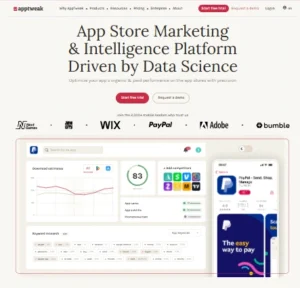
Key Features: AppTweak provides data-driven insights on keywords, ad intelligence, and ASO performance across app stores.
Pros: Known for its robust keyword research features and user-friendly interface.
Cons: Pricing might be a bit high for smaller developers.
Website URL: www.apptweak.com
#2: Sensor Tower
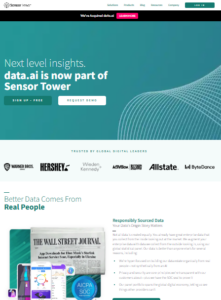
Key Features: Sensor Tower specializes in competitive analysis, giving insights into how your app stacks up against competitors.
Pros: Exceptional for tracking competitor performance and identifying emerging trends.
Cons: Not as focused on keyword discovery for beginners.
Website URL: www.sensortower.com
#3: AppFollow
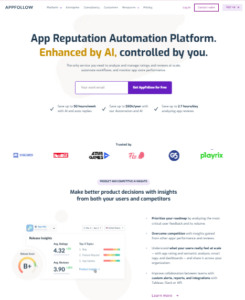
Key Features: AppFollow emphasizes tracking user feedback, helping you respond to reviews and ratings efficiently.
Pros: Great for maintaining a positive user rating, which can boost visibility.
Cons: Limited in keyword optimization tools compared to others.
Website URL: www.appdollow.io
#4: Mobile Action
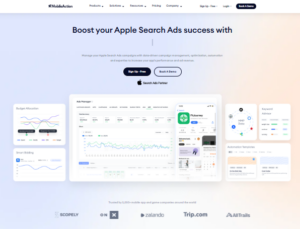
Key Features: Known for its unique advertising insights, Mobile Action is excellent for those looking to integrate ASO with paid marketing.
Pros: Combines ASO with ad insights, making it ideal for a holistic approach.
Cons: Some features are limited in the free version.
Website URL: www.mobileaction.co
#5: TheTool
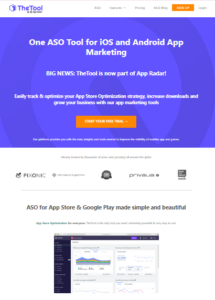
Key Features: TheTool’s intuitive dashboard allows you to monitor all ASO metrics in one place.
Pros: Perfect for beginners due to its ease of use and visual representation of ASO metrics.
Cons: Lacks advanced features required by more experienced ASO professionals.
Website URL: www.thetool.io
#6: ASOdesk
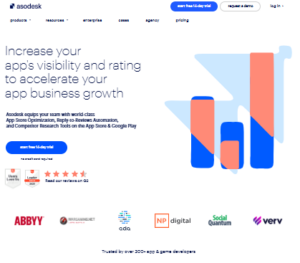
Key Features: ASOdesk stands out for its ability to generate keyword suggestions tailored to your app’s niche.
Pros: Ideal for keyword discovery, especially for niche apps.
Cons: Limited in tracking visual assets compared to other tools.
Website URL: www.asodesk.com
#7: Keyword Tool
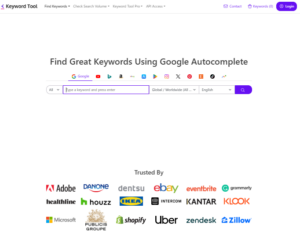
Key Features: Keyword Tool focuses on keyword discovery and tracking, which is central to improving app search rankings.
Pros: Excellent for those focused primarily on keyword optimization.
Cons: Limited in competitive insights.
Website URL: www.keywordtool.io
Comparing Paid vs. Free ASO Tools
Free ASO tools can be great for startups with limited budgets, but paid tools often provide additional features, such as competitor analysis and ad insights. For scaling businesses, investing in a paid tool can deliver valuable, in-depth data that free tools may not offer.
How to Choose the Top ASO Tool for Your Needs
When selecting an ASO tool, consider your budget, primary goals (keywords, reviews, or competitive analysis), and the app’s current market position. For instance, a new app may prioritize tools focused on keywords, while a seasoned app may focus more on competitive analysis.
Best Practices for Using ASO Tools
- Regularly Update Keywords: App trends shift often; updating keywords monthly can help maintain relevance.
- Engage with User Feedback: Responding to reviews, especially negative ones, can improve ratings.
- Track Competitors: Monitoring competitor strategies can reveal gaps or new opportunities for optimization.
Conclusion
In today’s competitive app market, having the Top ASO tools can make all the difference between getting noticed and getting lost. By leveraging top tools like AppTweak, Sensor Tower, and Mobile Action, app developers can optimize keywords, monitor competitors, and engage users effectively, driving more downloads and engagement.
To further enhance your app’s reach and success, consider partnering with App Marketing Plus. As a dedicated app marketing agency, App Marketing Plus specializes in boosting app visibility, user acquisition, and downloads through advanced ASO strategies tailored to your app’s unique needs. From keyword optimization to conversion-focused advertising, we provide everything you need to stand out in the app store. Ready to make your app shine? Visit App Marketing Plus today and start maximizing your app’s potential!
FAQs
1. What is the Top ASO tool for beginners?
For beginners, tools like The Tool and AppTweak are great due to their user-friendly interfaces and essential ASO features.
2. How often should I update my ASO strategy?
Ideally, update your ASO strategy every 30-60 days to align with trends and maintain keyword relevance.
3. Can Top ASO tools replace an ASO specialist?
No, while ASO tools are powerful, they complement rather than replace the expertise and strategy of a specialist.
4. What’s the average cost of Top ASO tools?
Prices vary widely, from free to several hundred dollars per month depending on the features and capabilities.
5. Do ASO tools work for both iOS and Android?
Yes, most ASO tools offer support for both iOS and Android platforms, but it’s wise to confirm compatibility.
by Christopher S. | Oct 23, 2024 | Blogs |

mobile app marketing service
In today’s competitive digital landscape, creating a high-quality mobile app is only the first step. To truly succeed, businesses need a comprehensive marketing strategy that ensures their app reaches the right audience and achieves high engagement. This is where App Marketing Plus comes in, offering expert mobile app marketing services that drive app downloads, user retention, and revenue growth.
What is Mobile App Marketing?
Mobile app marketing services is the process of promoting your app to potential users throughout their entire user lifecycle—from the moment they discover your app, to downloading, using, and ultimately becoming loyal customers. A well-executed mobile app marketing strategy encompasses everything from App Store Optimization (ASO) to paid advertising, social media promotion, and user engagement tactics.
At App Marketing Plus, we provide end-to-end mobile app marketing solutions that align with your business goals. Whether you’re launching a new app or aiming to boost downloads for an existing one, our mobile app marketing services are designed to enhance your app’s visibility and performance across multiple platforms.
Key mobile app marketing services Offered by App Marketing Plus
- App Store Optimization (ASO)
ASO is essential for improving your app’s ranking in app stores like Google Play and the Apple App Store. By optimizing keywords, app descriptions, and visuals, App Marketing Plus ensures your app stands out from the competition, attracting organic traffic and increasing downloads.
- Paid Advertising Campaigns
Our team creates targeted ad campaigns across platforms like Google Ads, Facebook, Instagram, to drive high-quality traffic to your app. We utilize data-driven strategies to maximize your return on investment (ROI) and ensure that your budget is spent effectively.
- Influencer and Social Media Marketing
Building brand awareness and trust is crucial for mobile app success. Our influencer partnerships and social media strategies create buzz around your app, leading to more installs and user engagement. From Instagram influencers to YouTube reviews, we tailor the right mix of platforms for your audience.
- In-App Engagement & User Retention
Acquiring users is just the start. We help you keep them engaged with personalized in-app messaging, push notifications, and loyalty programs. By focusing on user retention, we ensure your app remains valuable to users, increasing lifetime value (LTV).
- App Launch Strategy
A well-executed launch is critical for long-term success. Our experts plan every detail, from pre-launch buzz to post-launch advertising and updates. We provide a strategic roadmap to ensure your app hits the market with impact and sustains momentum.
- Comprehensive Analytics and Reporting
Data-driven decisions are at the core of our approach. App Marketing Plus tracks all key performance indicators (KPIs) like downloads, installs, user retention rates, and revenue. Our detailed reports help you understand how your app is performing and what optimizations are needed.
Why Choose App Marketing Plus for mobile app marketing services?
- Proven Expertise: Our team has years of experience in helping apps across various industries achieve success.
- Customized Strategies: We don’t believe in one-size-fits-all solutions. Every app is unique, and we craft marketing strategies tailored to your specific needs and goals.
- Full-Service Approach: From ASO to user retention strategies, we offer end-to-end solutions that cover every aspect of mobile app marketing.
- Transparent Reporting: You’ll always know how your marketing campaigns are performing with our clear, concise reporting and insights.
Boost Your App’s Success with App Marketing Plus
No matter what stage your mobile app is in—whether it’s still in development or already in app stores—App Marketing Plus is here to help you maximize its potential. Our comprehensive mobile app marketing services will ensure that your app not only reaches the right users but also retains them for the long haul, ultimately driving growth and profitability.
Ready to grow your app? Contact App Marketing Plus today to discuss how we can create a winning mobile app marketing strategy for your business!
by Christopher S. | Oct 15, 2024 | Blogs |
Launching an app is just the beginning of a long journey. To ensure success, implementing the right marketing strategies is essential. This guide covers 10 must-know app marketing strategies to help your app thrive in a competitive market.
1. Optimize for App Store Visibility (ASO)
on od the best App Marketing Strategies is App Store Optimization (ASO) is crucial for increasing your app’s visibility. By using targeted keywords in your app’s title, description, and metadata, you improve its ranking. High-quality images, screenshots, and an engaging app icon also contribute to better conversion rates.
2. Leverage Social Media Marketing
Second most App Marketing Strategies is Social media platforms like Instagram, Facebook, and Twitter are ideal for promoting your app. Regularly post engaging content, videos, and app tutorials. Collaborating with influencers can also amplify your app’s reach to a broader audience.
3. Create a Pre-Launch Campaign
Building excitement before your app’s launch can create a buzz. Set up a landing page, run teaser campaigns, and collect emails to keep potential users updated. A pre-launch campaign ensures you have a ready audience on day one.
4. Offer Incentives and Referral Programs
Offer special incentives like discounts, premium features, or rewards to users who invite others. A referral program encourages users to share your app, growing your user base organically.
5. Engage with Push Notifications
Push notifications are an effective tool for retaining users. Send personalized messages, updates, or reminders about new features. However, avoid overloading users with too many notifications, as it can lead to uninstalls.
6. Invest in Paid Ads
Google Ads, Facebook Ads, and Instagram Ads are excellent platforms for driving traffic to your app. Use well-targeted campaigns to reach potential users based on demographics, interests, and behaviors. Paid ads can give your app the initial boost it needs.
7. Build an Engaging Website
A website acts as a central hub for information about your app. Optimize it for SEO by including relevant keywords, and ensure it is user-friendly. Having an engaging website helps with organic discovery and boosts your app’s credibility.
8. Focus on Content Marketing
Creating valuable content such as blogs, videos, and how-to guides can attract potential users. This content not only educates your audience but also improves your app’s SEO. Share your content across social media platforms and other channels.
9. Collaborate with Influencers and Bloggers
Influencers and bloggers who specialize in your app’s niche can give your app credibility. Reach out to them for reviews, testimonials, or sponsored content. Their audience trusts their opinion, making this a powerful marketing strategy.
10. Track and Analyze Performance
Use tools like Google Analytics and in-app analytics to track user behavior, acquisition channels, and conversion rates. Understanding these metrics helps you optimize your marketing strategies and improve user engagement.
By implementing these 10 App Marketing Strategies, you’ll boost your app’s visibility, increase downloads, and ultimately, ensure its success in the competitive app market.
Conclusion
Mastering app marketing is key to your app’s success. By leveraging the strategies discussed, including ASO, social media marketing, and paid ads, you can significantly increase visibility, user acquisition, and retention. For a comprehensive app marketing solution that integrates all these App Marketing Strategies and more, consider App Marketing Plus. With expert guidance and a customized plan, App Marketing Plus will help you reach your app’s full potential.
FAQ
Q1: What is App Store Optimization (ASO)?
ASO is the process of improving your app’s visibility in the app stores by optimizing its title, keywords, description, and images.
Q2: How can I increase app downloads through social media?
By posting engaging content regularly, collaborating with influencers, and running targeted ads on platforms like Facebook, Instagram, and Twitter, you can drive more traffic to your app.
Q3: Why are push notifications important?
Push notifications help you engage and retain users by reminding them about your app’s features, updates, and special offers.
Q4: Should I invest in paid ads for my app?
Yes, paid ads are effective for reaching a larger audience quickly. Platforms like Google Ads and Facebook Ads allow you to target users based on their behavior and interests.
Q5: How can I track my app’s marketing performance?
Using analytics tools like Google Analytics, you can track user behavior, downloads, and the effectiveness of your marketing campaigns to make data-driven decisions.
by Christopher S. | Oct 3, 2024 | Blogs |
Introduction
App Store Optimization (ASO) is the process of improving an app’s visibility in app stores, such as Google Play and Apple App Store, to increase downloads. With millions of apps competing for attention, ASO is vital for ensuring your app gets noticed by the right audience. In this article, we’ll explore the top benefits of App Store Optimization (ASO) and how it can significantly boost your app downloads.
1. Increased Visibility in App Stores
ASO helps your app rank higher in app store searches by optimizing keywords, app title, and descriptions. This makes it easier for potential users to discover your app when searching for relevant categories or services.
2. Enhanced Organic Downloads
A well-optimized app enjoys organic downloads as users find it through searches rather than relying on paid ads. This helps reduce acquisition costs while driving steady growth.
3. Higher User Engagement and Retention
By improving your app’s visuals, such as icons and screenshots, and ensuring the app is easy to understand and navigate, ASO can boost user engagement. An attractive app page encourages users to download and stay engaged, leading to better retention rates.
4. Better Conversion Rate
Optimizing elements like the app’s name, subtitle, and reviews can drastically improve the app’s conversion rate. Users are more likely to download an app with high-quality visuals and positive reviews.
5. Increased Revenue and Monetization
With more downloads and engaged users, ASO can lead to increased in-app purchases, subscriptions, and ad revenue. A higher download count can also attract investors and advertisers, boosting overall revenue.
6. Competitive Advantage
ASO gives you an edge over competitors by ensuring that your app appears before theirs in relevant search results. By staying on top of trends and continually optimizing your app, you can outperform competitors and secure a larger share of the market.
Conclusion
App Store Optimization is essential for any app looking to grow its user base and achieve long-term success. With enhanced visibility, improved downloads, better user retention, and increased revenue, ASO can be the game-changer for your app. Don’t miss out on the benefits of ASO—start optimizing today!
FAQ:
App Store Optimization (ASO) is the process of improving an app’s visibility in app stores like Google Play and Apple App Store to increase organic downloads.
2. How does ASO help with app downloads?
ASO enhances the visibility of your app in app store search results by optimizing keywords, descriptions, and visuals. This increases the likelihood that users will find and download your app.
3. Can ASO increase app revenue?
Yes, ASO can increase app revenue by driving more organic downloads, improving user engagement, and leading to higher in-app purchases, subscriptions, or ad revenue.
4. How long does it take to see results from ASO?
ASO is a long-term strategy, and it may take a few weeks or months to see significant results. Continuous monitoring and optimization are key to sustained success.
by Christopher S. | Sep 30, 2024 | Blogs |
How to Promote Your Mobile App
Promote Your Mobile AppsYou’ve poured your heart into creating your mobile app. Endless hours of coding, design, and testing have gone into it, and now it’s finally here (How to Promote Your Mobile App ) — ready to change the world. But there’s one small hurdle left: getting people to actually use it. How do you make sure that the app you worked so hard on doesn’t just disappear into the vast sea of the app stores?
Promoting your app isn’t just a step; it’s the key to unlocking the success you’ve dreamed of. Without it, all that hard work could go unnoticed. But with the right strategy, your app can soar.
Understanding Mobile App Promotion
What Does App Promotion Involve?
App promotion is much more than just telling people, “Hey, my app exists!” It’s about strategically connecting your app with the people who will truly benefit from it. Think of it as a bridge between your app and its future users.
Why Just Building Isn’t Enough
The truth is, simply building a fantastic app isn’t enough anymore. The app market is flooded with options, so if you don’t make your presence known, it’s like shouting in a room full of people—no one’s going to hear you unless you stand out. Promotion is how you turn heads.
Defining Your Target Audience
Who Will Benefit Most from Your App?
Before you start promoting, you need to know who you’re promoting to. Who is your app designed for? Defining your target audience allows you to create tailored marketing messages that resonate on a personal level. Your app isn’t for everyone, and that’s okay! It’s for the people who need it most.
Understanding User Pain Points
What problems does your app solve? If you can communicate the solution your app offers to a specific problem, your audience will immediately pay attention. People aren’t just looking for cool apps—they’re looking for solutions.
App Store Optimization (ASO)
Mastering the App Store
App Store Optimization (ASO) is your first weapon in the app promotion battle. It’s all about optimizing your app’s listing in app stores to make it more discoverable. Just like SEO for websites, ASO ensures that your app ranks higher in search results.
The Importance of Keywords
One of the key factors in ASO is choosing the right keywords. What terms are your potential users searching for? Integrating those keywords into your app description and title will make your app more likely to be found by the right people.
Leveraging Social Media Marketing
Building Buzz on Social Platforms
Social media is where your app can come to life. Use platforms like Instagram, Twitter, and Facebook to build anticipation before the app even launches. Share sneak peeks, features, and the story behind why you created it. The more relatable and engaging your content, the more likely people are to share it.
Paid Ads vs. Organic Growth
Paid advertising on social media can give you a quick boost, but organic growth—where people share your app out of genuine excitement—is what will sustain long-term success. A mix of both will help you cover all bases.
Creating Engaging Content
Blog Posts and Articles
Content marketing is another key component of promoting your app. Writing blog posts or articles about how your app solves problems can position it as an expert solution. Focus on topics that interest your audience and that relate to the core purpose of your app.
Videos and Tutorials
People love visuals. Create how-to videos, tutorials, or even behind-the-scenes content to show what makes your app special. Make it fun, make it engaging, and most importantly, make it useful.
Influencer Marketing
Choosing the Right Influencers
Partnering with influencers in your niche can give your app a massive boost. But don’t just go for the big names. Sometimes, micro-influencers who have a highly engaged, smaller audience are more effective. The key is finding influencers whose audience aligns with your target users.
Authenticity Over Numbers
It’s tempting to choose influencers based on their follower count, but what really matters is authenticity. Does the influencer genuinely like your app? Will their endorsement feel sincere to their audience? If the connection feels forced, it won’t work.
Utilizing Email Marketing
Crafting the Perfect Email Campaign
Email marketing is still one of the most effective ways to reach your audience directly. Build an email list before launch and use it to keep people updated on your app’s progress, features, and exclusive offers.
Timing and Frequency
Don’t bombard your audience with emails, but don’t go silent either. Finding the right balance of regular updates without overwhelming your subscribers is key.
Paid Advertising Strategies
Google Ads, Facebook Ads, and Beyond
Paid ads are an investment in your app’s visibility. Platforms like Google Ads and Facebook Ads allow you to target specific demographics. You can tailor your ad campaigns to reach people based on their age, location, interests, and more.
Getting the Most from Your Budget
Paid ads can be costly if not handled correctly. Start with a small budget, test different ads, and see which ones perform the best. Then, double down on what works.
Partnering with Other Apps and Platforms
Cross-Promotions That Make a Difference
Collaborating with other apps can open doors to new audiences. Find apps that complement, not compete with, yours and set up cross-promotion strategies that benefit both of you.
Finding Synergistic Partnerships
Look for synergies where both apps or platforms can benefit. For example, a fitness app could partner with a healthy eating app, offering users value from both angles.
Gathering and Leveraging User Reviews
Why Reviews Matter
User reviews are the social proof your app needs. When new users see positive feedback, they’re more likely to download your app. It’s a trust signal.
Encouraging Users to Share Their Experiences
Prompt users to leave reviews through in-app notifications or emails. Offer incentives like discounts or exclusive features in exchange for their feedback.
Hosting a Launch Event
Online vs. Offline Launch Events
Depending on your audience, you can choose to host a virtual or physical launch event. Online events allow you to reach a global audience, while offline events can create a more intimate, personal connection.
Creating a Memorable Experience
No matter the format, make sure your launch event is memorable. Showcase the best features of your app, offer exclusive access, and engage directly with attendees.
Tracking and Analyzing Your Promotion’s Success
The Importance of Analytics
You won’t know how effective your promotion is unless you track it. Use analytics tools to monitor downloads, user engagement, and other key metrics.
Adjusting Your Strategy Based on Data
If something isn’t working, change it. Analyze the data and tweak your strategy to focus on what’s delivering the best results.
Maintaining Momentum Post-Launch
Consistent Updates and New Features
Don’t let your app go stale after launch. Regular updates and new features keep users engaged and show that you’re committed to improving the experience.
Keeping Your Audience Engaged
Ongoing communication with your audience through social media, email, or in-app notifications will help you keep users excited about your app long after the initial launch.
Conclusion
Promoting your mobile app is more than just marketing—it’s about sharing your vision with the world. Every feature you built, every problem your app solves, and every user you reach brings you closer to success. But remember, you don’t have to do it alone.
App Marketing Plus can be the partner you need on this journey they know How to Promote Your Mobile App. With expert strategies tailored specifically to your app’s needs, we help you break through the noise and reach the people who need your app the most. Whether it’s mastering App Store Optimization, running targeted ad campaigns, or building buzz on social media, App Marketing Plus is here to turn your hard work into the recognition it deserves.
Let’s work together to take your app from idea to sensation. Your success story is waiting to be written, and App Marketing Plus is ready to help you write it.
FAQs
- How much should I budget for app promotion?
It depends on your goals and target audience. Start with a modest budget, test, and scale based on performance.
- What’s the best social media platform for promoting my app?
The best platform depends on your audience. Instagram are great for younger audiences, while LinkedIn may work better for business apps.
- How long does it take to see results from app promotion?
Results vary, but with consistent effort, you can start seeing progress within a few weeks to a few months.
- Is it worth investing in influencer marketing?
Yes, if done correctly. Choose influencers who align with your app’s values and have an engaged audience.
- Can I promote my app without spending any money?
Absolutely! Organic methods like ASO, content marketing, and social media engagement can all be effective without a financial investment.
by Christopher S. | Sep 27, 2024 | App Marketing, Blogs |
10 Best Mobile App Affiliate Marketing: Increase Your Earnings on the Go
Introduction:

best mobile app affiliate marketing
Affiliate marketing is a dynamic and fast-paced industry where being able to manage your campaigns on the go can be the key to success. Thanks to a variety of mobile apps, affiliate marketers can now track performance, manage accounts, create content, and even boost earnings—all from their mobile devices. In this post, we’ll explore the 10 best mobile app affiliate marketing to help you stay productive and increase your earnings wherever you are.
1. ClickBank
ClickBank is one of the best mobile app affiliate marketing networks. Their app allows you to easily track your earnings, view sales analytics, and manage your affiliate products on the go. It’s perfect for those using the ClickBank platform to promote digital products.
Key Features:
- Real-time reporting
- Sales analytics
- Earnings tracking
2. CJ Affiliate ( One of the Best Mobile App Affiliate Marketing )
CJ Affiliate is a leading global affiliate marketing network. The mobile app lets you check your stats, view real-time data, and stay updated with your campaigns, all from the convenience of your smartphone.
Key Features:
- Quick access to reports
- Commission tracking
- Real-time notifications
3. Awin
Awin is a global mobile app affiliate marketing network offering a wide range of programs. Their app provides seamless tracking of your campaigns, with detailed reports on clicks, conversions, and commission.
Key Features:
- Multi-channel data tracking
- Performance reporting
- Easy-to-navigate dashboard
4. Amazon Associates
As one of the largest mobile app affiliate marketing globally, the Amazon Associates app allows you to quickly create links, track commissions, and manage your affiliate activity directly from your mobile device.
Key Features:
- Product linking
- Real-time earnings tracking
- Customizable reports
5. ShareASale
With ShareASale’s mobile app, you can access your mobile app affiliate marketing dashboard, manage merchant relationships, and monitor your earnings with ease. It’s great for affiliates who use the ShareASale platform to promote their products.
Key Features:
- Affiliate relationship management
- Performance reports
- Real-time notifications
6. Google Analytics
Though not strictly an affiliate tool, Google Analytics is essential for tracking the traffic and performance of your affiliate links. With the app, you can access critical website data, allowing you to optimize your mobile app affiliate marketing strategies effectively.
Key Features:
- Website traffic tracking
- Real-time analytics
- Custom reporting
7. Pretty Links
Pretty Links is a link management tool that allows you to create, manage, and track affiliate links. The mobile app lets you shorten links, view click statistics, and even create QR codes on the go.
Key Features:
- Link tracking
- URL shortening
- Real-time click stats
8. ThirstyAffiliates
ThirstyAffiliates is a WordPress plugin that helps affiliate marketers cloak, manage, and track their affiliate links. The app gives you easy access to link management, ensuring you can make updates and track clicks anytime.
Key Features:
- Affiliate link management
- Click tracking
- Easy-to-use dashboard
9. Buffer
Social media is a crucial part of affiliate marketing, and Buffer helps you manage and schedule your posts across multiple platforms. With the Buffer app, you can create a content calendar, automate posts, and track engagement.
Key Features:
- Post scheduling
- Content calendar
- Analytics for social performance
10. MailChimp
Email marketing is an essential component of mobile app affiliate marketing. MailChimp allows you to build, send, and track email campaigns directly from your mobile device, making it a powerful tool for affiliate marketers on the go.
Key Features:
- Email campaign management
- Audience segmentation
- Email analytics
Conclusion:
These mobile apps are essential tools for affiliate marketers who want to increase their earnings and manage their campaigns efficiently, no matter where they are. Whether you need to track commissions, manage your social media posts, or check performance analytics, these apps will keep you connected and productive. Contact app marketing plus for more details
FAQs
1. Which app is best for managing multiple affiliate programs?
CJ Affiliate is One of the Best mobile app affiliate Marketing Platform and ShareASale are great options for managing multiple programs from a single dashboard.
2. How can I track the performance of my affiliate links?
Apps like Pretty Links and ThirstyAffiliates are perfect for tracking and managing affiliate link performance.
3. What’s the best app for social media management in affiliate marketing?
Buffer is an excellent app for scheduling and managing social media posts for affiliate promotions.









